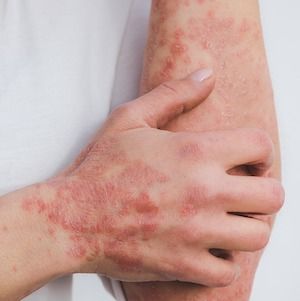News
Article
UPREAL-PsA: Upadacitinib Maintains Efficacy in Psoriatic Arthritis at 24 Weeks
Author(s):
24-week results from the UPREAL show higher efficacy of upadacitinib among males with PsA, bio-naïve patients, and those with elevated baseline C-reactive protein.
Credit: Pixabay/Miller_Eszter

New results from the UPREAL-PsA study demonstrate the maintained efficacy and safety of upadacitinib therapy at 24 weeks among patients with psoriatic arthritis (PsA) in a real-life setting.1
Upadacitinib (RINVOQ), an oral, reversible Janus Kinase (JAK) inhibitor, was approved by the US Food and Drug Administration (FDA) in December 2021 for patients with active PsA.2
These results, from an ongoing multicenter prospective cohort study, showed higher efficacy with upadacitinib therapy was achieved among males with PsA, bio-naive patients, and individuals with elevated baseline C-reactive protein (CRP) across 10 centers in Italy.1
“Our data show that UPA is effective already at 12 weeks and maintains activity at 24 weeks, both in the composite and in the single domains scores (peripheral, enthesis, and skin ones), in agreement with the results of RCTs,” wrote the investigative team, led by Michele Maria Luchetti Gentiloni, MD, department of Molecular and Biological Sciences, Marche Polytechnic University
Despite the available therapies for PsA, approximately one-third of patients are able to achieve and maintain low disease activity.3 As a result, there is a significant need for personalized treatment according to a patient’s phenotype and effective novel therapies across disease domains. Citing a lack of real-world data on upadacitinib in clinical practice, Gentiolini and colleagues assessed its effectiveness and safety over a 24-week period in patients with PsA with peripheral and axial involvement. 1
UPREAL-PsA included 126 patients with PsA treated with 15 mg upadacitinib in 10 Italian referral centers and evaluated clinical response, treatment-related adverse events, and laboratory parameters. The included patients with PsA met study criteria, including the absence of Minimal Disease Activity (MDA) criteria, failure towards ≥1 conventional synthetic disease-modifying anti-rheumatic drug (DMARD) for bio-naive patients, or failure or ≥1 biological or targeted synthetic DMARD.
Within the analysis, the primary effectiveness outcome was the proportion of patients who achieved MDA and Very Low Disease Activity (VLDA) status at week 24. The secondary effectiveness outcome was the proportion of patients who achieved a clinically relevant response in Disease Activity Index for Psoriatic Arthritis (DAPSA) and Ankylosing Spondylitis Disease Activity Score With C-Reactive Protein (ASDAS-CRP) scores. Safety outcomes included the proportion of serious adverse events during the study’s observation period.
At baseline, a total of 126 patients were enrolled, including 86 (68%) women. Most patients (n=124 [98%]) showed peripheral involvement, while axial involvement was observed in 54 patients (43%). Additionally, most patients (n=109 [87%]) were bio-failure with 19 (17%) having failed 1 line, 27 (25%) failing 2 lines, and 63 (58%) failing ≥3 lines of biologic or targeted synthetic DMARDs.
At the time of the analysis, 97 (77%) and 66 (52%) patients reached the week 12 and week 24 assessments, respectively. Regarding the effectiveness of upadacitinib at 24 weeks, the MDA and VLDA status were achieved in 47% and 14% of patients, while DAPSA remission and ASDAS-CRP inactive disease were achieved in 23% and 48% of patients, respectively.
Minor, moderate, and major DAPSA response were achieved in 67%, 39%, and 23% of patients, respectively. Meanwhile, ASDAS clinically important improvement and major improvement were achieved in 15 of 23 (65%) and 8 of 23 (35%) patients, respectively, with axial involvement at week 24.
Overall, the mean change from baseline was significant for DAPSA (15.9 ± 13.5, respectively; P <.001) and for ASDAS-CRP (1.22 ± 0.97, respectively; P <.001). Regarding safety, 13 patients (10%) discontinued upadacitinib therapy due to a lack of efficacy or non-serious adverse events, but no serious adverse events were observed.
Investigators conducted a multivariate regression analysis to identify predictors of MDA response. The analysis showed male gender (odds ratio [OR], 2.54; 95% CI, 1.03 - 6.25; P = .043), bio-naive status (OR, 4.13; 95% CI, 1.34 – 12.71; P = .013), and high baseline CRP (OR, 2.49; 95% CI, 1.02 - 6.12; P = .046) were associated with achieving MDA at week 24.
“These data corroborate similar recent findings supporting the need for a gender-specific evaluation and therapeutic strategy adjustment in PsA patients,” investigators wrote.
References
- Luchetti Gentiloni, M.M., Paci, V., Carletto, A. et al. Upadacitinib effectiveness and factors associated with minimal disease activity achievement in patients with psoriatic arthritis: preliminary data of a real-life multicenter study. Arthritis Res Ther 25, 196 (2023). https://doi.org/10.1186/s13075-023-03182-9
- Pine L. FDA approves upadacitinib (RINVOQ) for treatment of active psoriatic arthritis. HCP Live. March 3, 2023. Accessed October 25, 2023. https://www.hcplive.com/view/fda-approves-upadacitinib-rinvoq-for-treatment-of-active-psoriatic-arthritis.
- Hagège B, Tan E, Gayraud M, Fautrel B, Gossec L, Mitrovic S. Remission and low disease activity in psoriatic arthritis publications: a systematic literature review with meta-analysis. Rheumatology. 2020;59:1818–25





